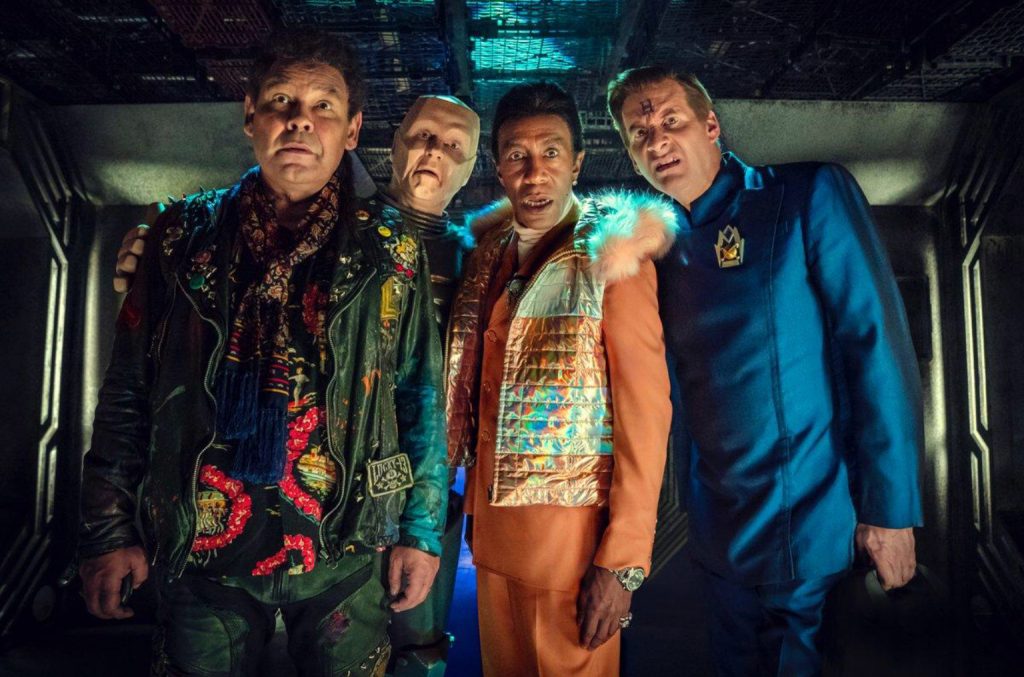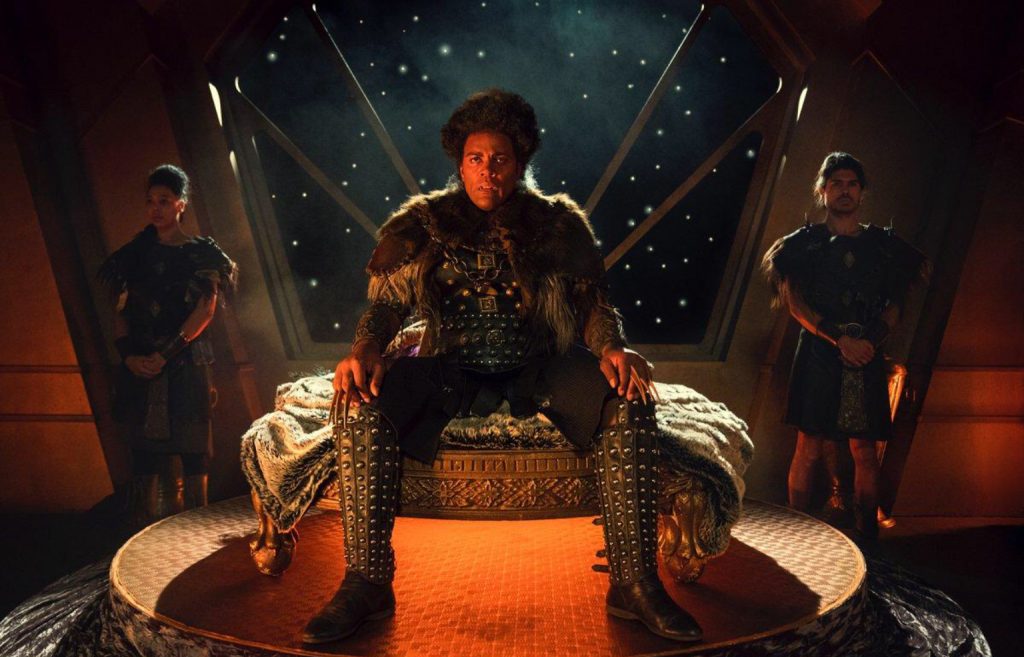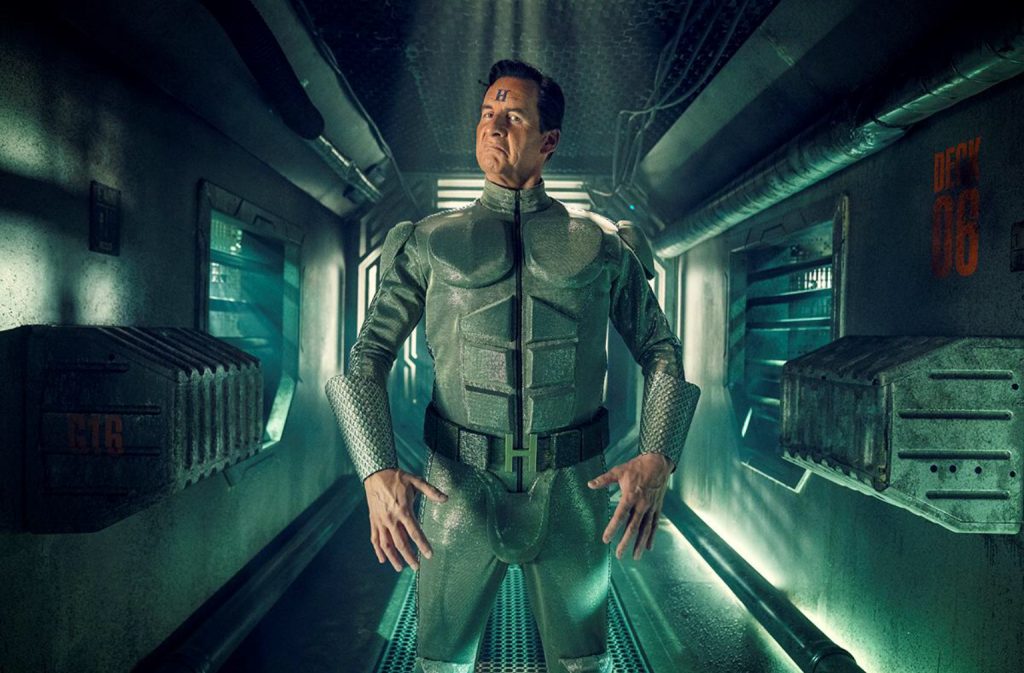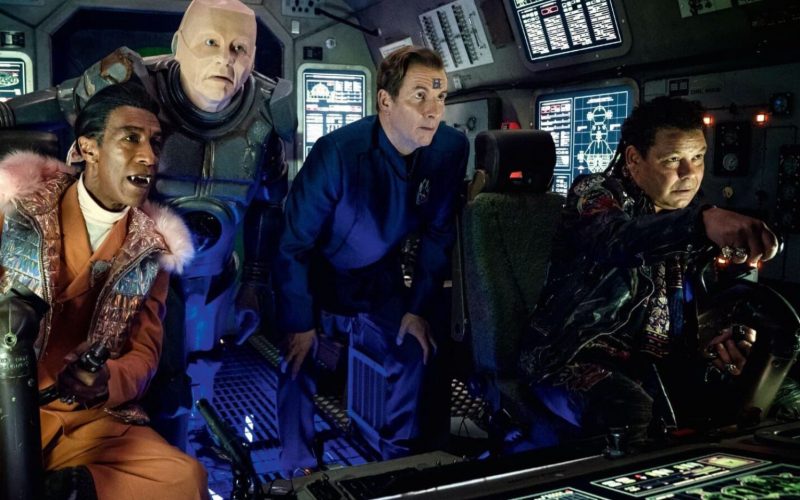Red Dwarf: The Promised Land (2020).
The science-fiction comedy Red Dwarf, about a group of hapless nobodies adrift in deep space, has been airing new episodes on the UKTV channel Dave since 2009. It is now back with a special ninety-minute episode, Red Dwarf: The Promised Land, the premise of which will be recognised by longstanding fans as a kind of sequel to the Series I episode, Waiting for God. In short: the slobby, curry eating Lister is God to a race of humanoid cats which he inadvertently created.
In The Promised Land, a feral member of the race of cats has become the tyrannical leader of all cat people, determined to stamp out any religious followers of the God Cloister, which is a mangling of the name Lister. Three such believers manage to escape the Feral King and go in search of the spaceship Red Dwarf and their vindaloo eating God. Meanwhile, the ship’s computer Holly has been brought back online, but he’s not quite his senile old self, and has sensibly decided to decommission the small rouge one, meaning that the Dwarfers have to scarper, pronto. They soon encounter the religious feline fugitives, but just as Lister’s adjusting to Godhood, the Feral King finds them and attacks.

Red Dwarf has been in fine form since re-emerging on Dave, with many episodes from seasons X, XI and XII approaching the classic form of the show in its BBC2 heyday. Therefore, this new extended episode should be a treat for those of us who have stuck with the show over the years. So why isn’t it?
Let’s start with the writing. Red Dwarf jokes now have a comfortable familiarity. This is rather charming over a snug half an hour, but well before one reaches the ninety-minute mark, it gets a little tiring being able to guess the punchline several seconds before it hits. Of course, this isn’t always the case. There are some strong lines, good visual gags, and whole scenes that play out with plenty of laughs. An early scene where Kryten attempts to convince Cat to consider gender reassignment so that Lister can carry on the human race is top-notch. Nonetheless, there isn’t enough material of this quality to keep the viewer properly amused throughout.

Red Dwarf has always been at its best when it takes high concept ideas and crams them into a tight thirty-minute episode. Here it feels as if Naylor has taken several great ideas, each of which could have been developed separately and made into strong individual episodes, and has instead interwoven them into a somewhat baggy narrative, with as many dead-spots as high-spots. The high-spots include Rimmer levelling up his lightbee in a way that makes him at least as cool as Ace Rimmer. While the dead-spots certainly include the new cat characters. The three religious cats are mopey and don’t have a funny line between them, while the Feral King is too much camp and not enough menace.
For several years, Doug Naylor attempted to make a Red Dwarf feature film, and though this probably wasn’t an attempt at that, The Promised Land would definitely have been helped by a little more visual panache. One of the reasons that the last few series of Red Dwarf have seen the show back to its best is that it has once again been filmed in front of a live audience (the later BBC series’ were not). But perhaps it would have been better if The Promised Land had been shot on film, without an audience, to make it feel, well, more special, and to give Naylor more leeway for style. In fairness, the sets are now as good as they were back in the BBC days and the special effects are also well executed.

Thankfully the original cast are all on good form, particularly Chris Barry, who, as ever, manages to squeeze plenty of pathos out of Rimmer, running the gamut between pitiable, loveable, loathsome and reluctantly brave. He also gets most of the best material. And the relationship between Lister and Rimmer still works. The spikey bromance between these two men has always provided the show with its emotional core. Danny John Jules remains a joy as the self-adoring Cat and somehow still manages to summon up the hyperactive energy that has always made the character such a scene-stealer. Holly is back in the form of Norman Lovett and gets plenty of comic mileage out of being dense. It really is a shame that Doug Naylor wrote the character out for a number of series. However, this critic is still awaiting the return of Hattie Hayridge, who played the character in all of the very best seasons.
Red Dwarf: The Promised Land is far from being the show at its best, but this should come as no surprise. Red Dwarf has only ever really worked when it’s been presented as tight standalone thirty-minute episodes. Red Dwarf: The Promised Land may well have enough going for it to keep loyal fans happy as they await a new series, but if you’re a fan tempted to use this as an excuse to return to the small rouge one, this critic would recommend starting at Series X and working your way from there.
Film ’89 Verdict – 5/10
Red Dwarf: The Promised Land is released April 9th on UKTV’s Dave.

